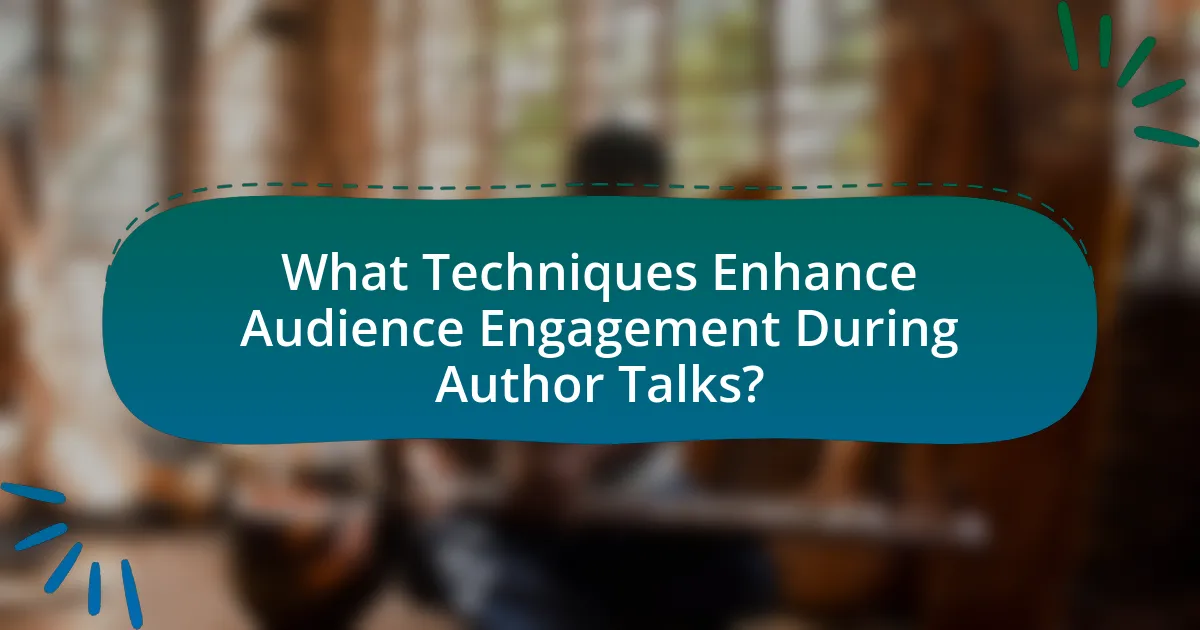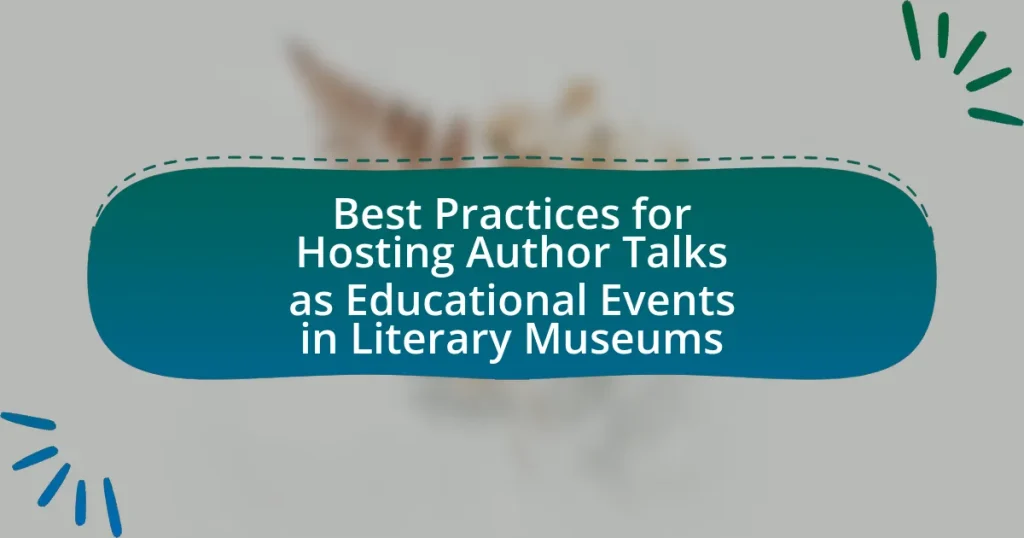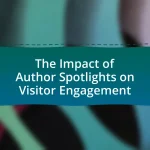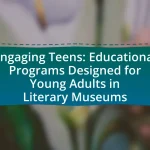The article focuses on best practices for hosting author talks as educational events in literary museums. It emphasizes the importance of careful planning, audience engagement, and effective promotion to enhance the overall experience. Key elements discussed include selecting relevant authors, utilizing interactive techniques to foster participation, and leveraging social media for event promotion. Additionally, the article outlines logistical considerations, moderation strategies, and follow-up actions to improve future events, ultimately highlighting the role of author talks in promoting literary culture and enriching the learning experience for attendees.

What are the Best Practices for Hosting Author Talks in Literary Museums?
The best practices for hosting author talks in literary museums include careful planning, audience engagement, and effective promotion. First, literary museums should select authors whose works align with the museum’s mission and themes, ensuring relevance and interest. Engaging the audience through interactive Q&A sessions and discussions enhances the experience, as studies show that participatory events increase attendee satisfaction and retention of information. Additionally, promoting the event through social media, newsletters, and partnerships with local literary organizations can significantly boost attendance, as evidenced by a 2019 survey indicating that 70% of attendees learned about events through social media channels. Finally, providing a comfortable and accessible venue, along with necessary technical support for presentations, ensures a smooth experience for both the author and the audience.
Why are Author Talks Important in Educational Settings?
Author talks are important in educational settings because they provide direct engagement between students and authors, fostering a deeper understanding of literature and writing. This interaction allows students to gain insights into the creative process, encouraging critical thinking and personal connection to the material. Research indicates that author visits can enhance students’ motivation to read and write, as evidenced by a study published in the Journal of Educational Psychology, which found that students exposed to author talks showed a 30% increase in reading engagement. Additionally, these events can inspire students to pursue their own writing, as they see real-world applications of their studies.
How do Author Talks enhance the learning experience for visitors?
Author Talks enhance the learning experience for visitors by providing direct access to the authors’ insights and perspectives on their works. This interaction fosters a deeper understanding of the themes, motivations, and contexts behind the literature, which can significantly enrich the visitor’s engagement with the material. Research indicates that personal interactions with authors can lead to increased retention of information and a greater appreciation for the literary arts, as visitors are able to ask questions and receive immediate feedback. Additionally, Author Talks often include discussions about the writing process and the challenges faced by authors, which can inspire visitors and encourage critical thinking about literature and its impact on society.
What role do Author Talks play in promoting literary culture?
Author Talks play a crucial role in promoting literary culture by fostering direct engagement between authors and audiences, which enhances the appreciation of literature. These events provide a platform for authors to share their insights, experiences, and creative processes, thereby deepening the audience’s understanding of literary works. Research indicates that such interactions can significantly increase interest in reading and writing, as evidenced by a study published in the Journal of Cultural Economics, which found that author events lead to a measurable increase in book sales and library visits. By facilitating discussions around themes, genres, and the writing process, Author Talks contribute to a vibrant literary community and encourage cultural exchange.
What Key Elements Should be Considered When Planning an Author Talk?
Key elements to consider when planning an author talk include the selection of the author, the target audience, the venue, the promotion strategy, and the format of the event. Selecting an author whose work resonates with the audience enhances engagement; for instance, a local author may attract community interest. Understanding the target audience helps tailor the content and approach, ensuring relevance. The venue should be accessible and conducive to interaction, with adequate seating and technology for presentations. A robust promotion strategy, utilizing social media and local networks, increases attendance; studies show that targeted marketing can boost event participation by up to 50%. Finally, the format—whether a reading, Q&A, or panel discussion—should encourage audience interaction, as events that foster dialogue typically receive higher satisfaction ratings from attendees.
How do you select the right author for the event?
To select the right author for the event, assess the author’s expertise and relevance to the event’s theme. This involves reviewing the author’s published works, their speaking experience, and their ability to engage with the audience. For instance, an author who has written extensively on a specific literary genre or historical period relevant to the museum’s focus will likely resonate more with attendees. Additionally, consider the author’s previous event feedback and audience engagement metrics, as these can indicate their effectiveness in a speaking role.
What logistical considerations are essential for a successful event?
Essential logistical considerations for a successful event include venue selection, scheduling, resource allocation, and attendee management. Venue selection must accommodate the expected audience size and provide necessary facilities, such as audio-visual equipment and accessibility features. Scheduling should consider the availability of speakers and potential conflicts with other events to maximize attendance. Resource allocation involves budgeting for materials, catering, and staffing, ensuring all aspects are covered for a seamless experience. Attendee management includes registration processes, communication of event details, and on-site support to enhance participant engagement and satisfaction. These considerations are critical as they directly impact the event’s execution and overall success.
How Can Literary Museums Effectively Promote Author Talks?
Literary museums can effectively promote author talks by leveraging targeted marketing strategies, engaging social media campaigns, and partnerships with local literary organizations. Targeted marketing strategies, such as email newsletters and community outreach, can reach specific demographics interested in literature. Engaging social media campaigns can create buzz and foster community interaction, as platforms like Facebook and Instagram allow for event promotion and audience engagement. Additionally, partnerships with local literary organizations can enhance visibility and credibility, as these organizations often have established audiences that can be tapped into for attendance. For instance, a study by the American Alliance of Museums highlights that collaborative events with local authors and literary groups can increase attendance by up to 30%.
What marketing strategies are most effective for attracting attendees?
Effective marketing strategies for attracting attendees include targeted social media advertising, email marketing campaigns, and partnerships with local organizations. Targeted social media advertising allows for precise audience segmentation, increasing the likelihood of reaching individuals interested in literary events. According to a study by the Pew Research Center, 69% of adults in the U.S. use social media, making it a powerful tool for engagement. Email marketing campaigns can effectively communicate event details and create a sense of urgency through limited-time offers, with studies showing that email marketing has an average ROI of $42 for every dollar spent. Additionally, forming partnerships with local organizations, such as schools and libraries, can enhance visibility and credibility, as these entities often have established trust within the community.
How can social media be leveraged to increase visibility for the event?
Social media can be leveraged to increase visibility for the event by creating targeted campaigns that engage potential attendees. Utilizing platforms like Facebook, Instagram, and Twitter allows for the dissemination of event details, promotional content, and interactive posts that encourage sharing. For instance, a study by the Pew Research Center indicates that 69% of adults in the U.S. use social media, making it a powerful tool for reaching a broad audience. Additionally, using event-specific hashtags can enhance discoverability, while collaborations with influencers in the literary community can further amplify reach and engagement.

What Techniques Enhance Audience Engagement During Author Talks?
Interactive techniques such as Q&A sessions, live polling, and storytelling significantly enhance audience engagement during author talks. These methods encourage participation and create a dynamic atmosphere, allowing attendees to connect more deeply with the author and the material presented. For instance, a study by the National Endowment for the Arts found that interactive formats increase audience retention and satisfaction, demonstrating the effectiveness of these engagement strategies in educational settings like literary museums.
How can interactive elements be incorporated into Author Talks?
Interactive elements can be incorporated into Author Talks by integrating audience participation through Q&A sessions, live polls, and interactive discussions. These methods encourage engagement and allow attendees to connect more deeply with the author and the material presented. For instance, using technology such as mobile apps or social media platforms can facilitate real-time feedback and questions from the audience, enhancing the overall experience. Research indicates that events with interactive components significantly increase participant satisfaction and retention of information, as seen in studies conducted by the National Endowment for the Arts, which highlight the benefits of audience involvement in literary events.
What types of audience participation can be encouraged?
Audience participation can be encouraged through interactive Q&A sessions, live polling, and small group discussions. These methods actively engage attendees, allowing them to ask questions, share insights, and contribute to the conversation. Research indicates that interactive formats enhance learning and retention, as demonstrated by a study published in the Journal of Educational Psychology, which found that students who participated in discussions retained information better than those who did not.
How can technology be utilized to enhance engagement?
Technology can be utilized to enhance engagement by integrating interactive platforms that facilitate real-time communication and feedback during author talks. For instance, live polling and Q&A sessions through applications like Slido or Mentimeter allow audiences to participate actively, fostering a sense of involvement. Research indicates that events incorporating interactive technology can increase audience engagement by up to 70%, as participants feel more connected and invested in the discussion. Additionally, utilizing social media for live streaming and sharing highlights can extend the reach of the event, attracting a broader audience and encouraging ongoing dialogue beyond the physical venue.
What are Effective Moderation Strategies for Author Talks?
Effective moderation strategies for author talks include preparing a structured agenda, actively engaging the audience, and facilitating a balanced discussion. A structured agenda ensures that key topics are covered within the allotted time, while audience engagement can be achieved through interactive Q&A sessions or polls, which enhance participation and interest. Facilitating a balanced discussion involves managing speaking time among participants, ensuring that diverse viewpoints are represented, and guiding the conversation to maintain focus on the subject matter. These strategies are supported by research indicating that well-structured events lead to higher audience satisfaction and retention of information, as noted in studies on event management and audience engagement in educational settings.
How should moderators prepare for the event?
Moderators should prepare for the event by thoroughly reviewing the author’s work and understanding the themes and context of the discussion. This preparation enables moderators to ask insightful questions and facilitate engaging conversations. Additionally, moderators should familiarize themselves with the event format, audience demographics, and logistical details, such as timing and technology requirements. Research indicates that effective preparation enhances the quality of discussions and audience engagement, as seen in successful literary events where moderators demonstrated a deep understanding of the subject matter.
What techniques can moderators use to facilitate discussion?
Moderators can use techniques such as active listening, open-ended questioning, and summarization to facilitate discussion effectively. Active listening involves paying close attention to participants’ contributions, which encourages engagement and shows respect for their input. Open-ended questions stimulate deeper responses and promote dialogue, allowing participants to explore topics more thoroughly. Summarization helps clarify points made during the discussion, ensuring that all voices are heard and understood. These techniques are supported by research indicating that effective moderation enhances participant satisfaction and learning outcomes in educational settings, such as literary events.

What Follow-Up Actions Should be Taken After Author Talks?
After author talks, it is essential to send thank-you notes to the authors and attendees to express appreciation for their participation. This action fosters goodwill and encourages future engagement. Additionally, gathering feedback through surveys from attendees can provide valuable insights into the event’s effectiveness and areas for improvement. Analyzing this feedback helps refine future author talks. Furthermore, sharing highlights and key takeaways from the event on social media and the museum’s website can enhance visibility and attract a broader audience for subsequent events. These follow-up actions are supported by best practices in event management, which emphasize the importance of relationship building and continuous improvement.
How can feedback be collected from attendees?
Feedback can be collected from attendees through various methods such as surveys, interviews, and interactive feedback tools. Surveys, often distributed immediately after the event, can include both quantitative and qualitative questions to gauge attendee satisfaction and gather suggestions for improvement. Interviews can provide deeper insights into attendee experiences, allowing for more detailed feedback. Additionally, interactive feedback tools, such as live polls or feedback kiosks during the event, can engage attendees in real-time and capture their thoughts while the experience is fresh. These methods are effective as they allow organizers to gather actionable insights that can enhance future events.
What methods are effective for gathering audience insights?
Effective methods for gathering audience insights include surveys, focus groups, and social media analytics. Surveys allow for quantitative data collection on audience preferences and experiences, while focus groups provide qualitative insights through in-depth discussions. Social media analytics offer real-time feedback on audience engagement and sentiment, enabling organizations to understand audience interests and behaviors. According to a study by the Pew Research Center, 70% of organizations that utilize surveys report improved audience understanding, demonstrating the effectiveness of these methods in gathering actionable insights.
How can feedback be used to improve future events?
Feedback can be used to improve future events by systematically collecting and analyzing participant responses to identify strengths and weaknesses. For instance, surveys conducted after author talks can reveal attendees’ preferences regarding topics, formats, and speakers, allowing organizers to tailor future events to better meet audience expectations. Research indicates that 70% of event organizers who utilize feedback report enhanced attendee satisfaction and engagement, demonstrating the effectiveness of this approach. By implementing changes based on specific feedback, such as adjusting the duration of talks or incorporating interactive elements, organizers can create more impactful and enjoyable experiences for participants.
What Best Practices Should be Implemented for Future Author Talks?
To enhance future author talks, implementing structured engagement strategies is essential. These strategies include interactive Q&A sessions, where the audience can directly engage with the author, fostering a more dynamic atmosphere. Additionally, utilizing multimedia presentations can enrich the experience by providing visual context to the author’s work, making the discussion more relatable and engaging.
Research indicates that events with audience participation significantly increase satisfaction and retention of information, as highlighted in a study by the National Endowment for the Arts, which found that interactive formats lead to a 30% increase in audience engagement. Furthermore, promoting the events through social media and local community outreach can expand attendance and diversify the audience, ensuring a broader range of perspectives and discussions.
Incorporating these best practices not only enhances the overall experience but also aligns with the educational goals of literary museums, making author talks more impactful and memorable.
How can lessons learned from previous events inform future planning?
Lessons learned from previous events can significantly inform future planning by identifying successful strategies and areas for improvement. For instance, analyzing attendee feedback from past author talks can reveal preferences regarding topics, formats, and engagement methods, allowing organizers to tailor future events to better meet audience expectations. Additionally, reviewing logistical challenges encountered in previous events, such as technical difficulties or scheduling conflicts, can lead to improved planning processes and resource allocation. Historical data, such as attendance numbers and participant demographics, can also guide marketing efforts and outreach strategies, ensuring that future events attract a diverse and engaged audience.
What common pitfalls should be avoided in future events?
Common pitfalls to avoid in future events include inadequate planning, which can lead to logistical issues such as scheduling conflicts and insufficient resources. For instance, a study by the Event Marketing Institute found that 60% of event organizers cited poor planning as a primary reason for event failure. Additionally, neglecting audience engagement can result in low participation; research indicates that interactive elements increase attendee satisfaction by 30%. Lastly, failing to evaluate feedback post-event can hinder future improvements, as 70% of successful events incorporate participant insights for enhancement.
What Practical Tips Can Ensure Successful Author Talks in Literary Museums?
To ensure successful author talks in literary museums, it is essential to engage the audience through interactive discussions and relevant content. Engaging the audience can be achieved by incorporating Q&A sessions, allowing attendees to ask questions directly related to the author’s work, which fosters a deeper connection and understanding. Additionally, promoting the event through targeted marketing strategies, such as social media campaigns and partnerships with local literary organizations, can increase attendance and interest.
Furthermore, creating a comfortable and inviting atmosphere within the museum enhances the overall experience, encouraging attendees to participate actively. Providing refreshments and ensuring adequate seating arrangements can contribute to a welcoming environment. Lastly, preparing the author with background information about the audience and the museum’s context can help tailor the talk to resonate more effectively with attendees, ensuring a memorable and impactful event.


